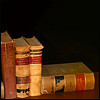
Again, quick summaries...
41 - Kindred - Octavia Butler - a really fascinating time-jump sci fi novel involving a woman from the 1960s jumping back in time to the antebellum South in order to save her male ancestor at various points in his life. Fantastic writing, tackling some really uncomfortable questions, and generally worth a read.
42 - Rome Burning - Sophia McDougall - the next of the Romanitas series, this time taking our protagonists into contact with the worlds of China and Japan, and the possibility of a world war. Plus intrigue within the state and terrorists and things. It's definitely a 'second' of a trilogy, but it makes you want to finish the plot.
43 -The Pendragon Protocol - Philip Purser-Hallard - recommended by somebody on here. Takes a while to get going, not least because of the style, but takes the view that the Arthurian legend is alive, well and operating through a system of devices that attach themselves to living humans. I quite fancy reading on, although irritatingly the next volume isn't in the local library.
44 - A Murder on the Appian Way - Steven Saylor - continuing the Gordianus the Finder series. This one pins itself to the murder of Clodius on the Appian Way, the prosecution of his arch-enemy Milo, and the continued collapse of the Roman Republic. I think one of the weaknesses of Saylor's writing is his decision to have his protagonist closely attached to Big Historical Events, something Lindsey Davis doesn't do so much - it means you sometimes feel like you're getting a chunk of undigested historiographer as background. But it's all quite engaging.
45 - Jonathan Strange & Mr Norrell - Susanna Clarke - LOVED IT. But what else would you expect of a book that essentially parodies academic culture, involves fairies and magicians, and has copious footnotes? I love the footnotes.
46 - Have His Carcase - Dorothy L. Sayers - the one with the professional dancer who gets his throat cut. What I love about this one is the way it captures a particular sort of seaside resort which is long dead, but Sayers feels no need to explain. Also, bonus Russian history interface, which is great fun.
47 - Ancillary Sword - Ann Leckie - G said he felt this didn't really go anywhere, but I thought it was lovely character building. Basically, one surviving component of what used to be a whole ship has to get used to commanding a ship herself, and working out how to behave around humans who aren't tech, and stuff. The plot could have been a bit more dramatic, but I think the sacrifice in significance pays off in the emotional/internal detail.
49 - Percy Jackson and the Battle of the Labyrinth - Rick Riordan - the one that plays off the Minotaur without actually mentioning the Minotaur (given it was killed off in the first book). It instead gives the Labyrinth a sense of place and identity that far exceeds any other mythical space that you encounter in the Riordan-verse, at least to my mind. Veeeerry interesting from a professional perspective; not bad in terms of plot.
50 - Cold Magic - Kate Elliott - an alternative world/history/thingummie with magic and descendants of dinosaurs and people marrying the wrong people by accident and contracts and the Wild Hunt and glaciers and airships and forbidden technology and THINGS. Jolly daft, jolly enjoyable.
51 - The Wonder Weeks - Hetty van de Rijt - another baby book which argues for predictable mental leaps in babies' development, with suggestions about what to do to help your child through them. Somewhat irritating in insisting that if your baby is particularly fussy or difficult, they must be gifted. (They could just be having a tough time and need a bit of extra love.) However, this is proving surprisingly useful for tracking general progress so far, and also has some good ideas for age-appropriate activities and games.
52 - The Happiest Baby on the Block - Harvey Karp - I read this too late, as it's designed for the first three months. Generally sound, although lots of primitivism and 'our ancestors did...'. Shame that all the tricks and ideas he suggests are things that probably won't work now, but we've done alright without them!
54 - 21st Century Boys - Sue Palmer - another book on boy raising, which is based in the British context and thus less irritatingly Australian than Steve Biddulph, but... yeah. Still a lot of primitivism, a lot of bashing straw feminists, and a lot of the advice/suggestions that she makes seem to be just as valid for girls as for boys. (She was planning to write a companion volume, so may not have realised this yet, but STILL.) That said, if I were to recommend a book that takes this tactic to people, it would be this over the Biddulph. With Cordelia Fine's Delusions of Gender on the side.